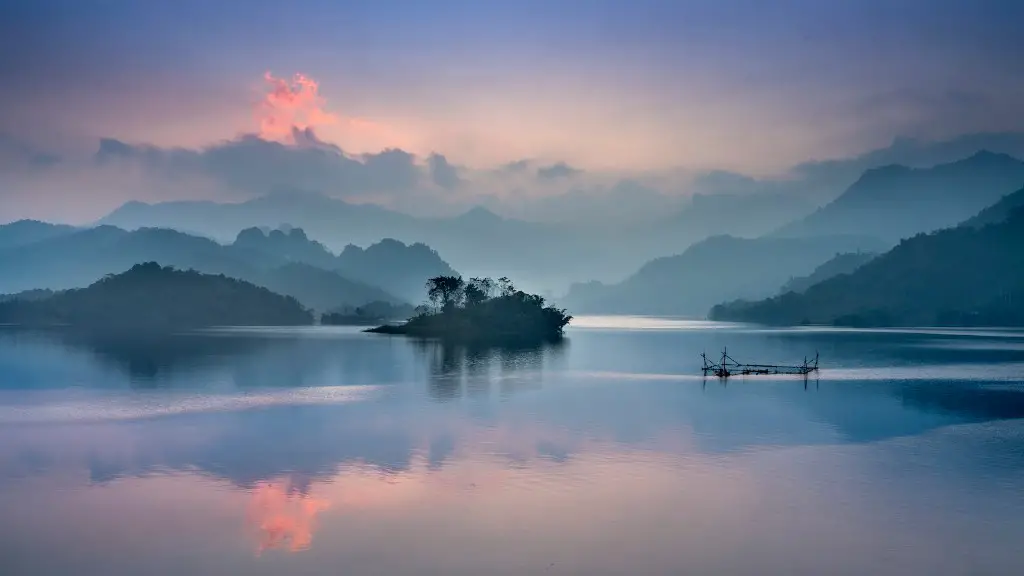The Nile River is one of the most iconic and important rivers in the world and is often referred to as the River of Life. The river stretches across nine countries in the African continent and holds immense historical, cultural and ecological significance. It is the longest river in the world and has been a major factor in the development of civilisations since antiquity. Its importance is undeniable and its name has become synonymous with life, fertility, prosperity and beauty. But why is the Nile River referred to as the River of Life? In this article, we will explore why this ancient river has such an important reputation and why its importance continues to this day.
The Nile River is the longest river in the world, stretching over 4,000 miles. It’s source is Lake Victoria and it flows northward through Sudan, Egypt, Ethiopia and downstream to the Mediterranean Sea. For centuries the Egyptians have relied on the waters of the Nile for irrigation and farming, which helped to create a thriving agricultural industry and fuelled the development of the ancient Egyptian Empire. Ancient Egyptians believed that their prosperity came from the waters of the Nile, and so it was given the title of ‘the River of Life’.
The Nile River was also a major source of transport for the ancient Egyptians. It was used to transport goods and people, and to travel between cities and kingdoms. Without the Nile, the ancient Egyptian Empire could not have flourished as it did. it is clear to see why the river was so integral to their civilisation, and why it was referred to as the River of Life.
Today, the Nile River has an even greater significance for economic growth in the region. In 2020, the African Development Bank estimated that the river’s value to the region’s economies is around $50 billion. The Nile River is a major source of irrigation and hydroelectric power, and supports a wide array of human activities such as industry, commerce, and fishing.
The Nile’s importance goes beyond economic activity – it is also recognised for its diverse range of flora and fauna. The Nile River Basin is home to over 400 species of fish and is an enormously important ecosystem in Africa. It provides a vital habitat for a variety of animals, including crocodiles, hippos and an array of waterfowl. Birds such as pelicans, ibises, egrets and flamingos feed along the entire length of the river, making the Nile a major destination for birdwatchers.
Ultimately, the Nile River is called the River of Life because of its immense importance in the development of ancient civilisations, its contribution to the economic growth of the region, and its rich and diverse ecosystems. It is an invaluable resource and a source of life in the African continent, and its priceless importance cannot be overstated.
Impact on Climate and Hydrology
The Nile River has an immense impact on the climate and hydrology of the region. The river absorbs a large fraction of precipitation during the year, and its seasonal flooding creates a cycle of wet and dry seasons that supports an incredible variety of agricultural activity. The Nile’s hydrological cycle plays an integral role in the region’s ecosystems and agriculture, and this is one of the main reasons why the river is referred to as the River of Life.
The river also has a major impact on the climate of the region. During the dry season, when the flow of the Nile is low, water evaporates from the river and forms clouds. These clouds carry moisture northward, resulting in rainfall over the region, keeping temperatures cooler and providing water for vegetation growth. This process is known as the ‘Nile effect’ and is one of the key factors contributing to the fertile soil and favourable climate in the region.
In recent years, the Nile River has faced intense pressure from climate change, with rising temperatures and changes to rainfall patterns threatening the sustainability of the region’s ecosystems, agricultural output and economic activity. Without urgent action, the river’s importance to the region could be dramatically undermined.
Political Importance
The Nile River is also an immensely important political resource in the region. Since colonial times, the river has been subject to a complex network of treaties and agreements that have divided the river’s water resources between the nine countries of the Nile Basin. Tensions over water resources remain high, particularly between nations such as Egypt and Sudan, and tensions over water rights have led to conflicts in the region in the past.
More recently, the term ‘nile politics’ has become synonymous with concerns about water security and sustainability in the region, and has become a major issue for international politics. The importance of the Nile River to the region’s geopolitical stability is undeniable, and its importance is likely to become increasingly pronounced with the ongoing effects of climate change.
Cultural Significance
Though the Nile is often referred to as the River of Life, its significance to the people of the region goes far beyond its economic and political importance. It has been a source of inspiration in art, literature and culture since antiquity. The ancient Egyptians revered the Nile and worshipped its creator, the god Hapi, as the giver of life and fertility. Its significance is still celebrated today in the form of festivals, dances and rituals. The river has become synonymous with life, fertility, beauty and eternity.
The Nile River is sacred to the people of the region and its importance cannot be overstated. Its importance to life and prosperity in the region is undeniable and its legacy will continue to inspire and delight future generations.
Conservation Efforts
The importance of the Nile River to the region’s ecology and economy means that conservation efforts are ongoing. A range of initiatives have been introduced in recent years to protect the river’s ecosystems and ensure its water resources are sustainably managed. These include measures to reduce water pollution, encourage agricultural practices that are more water efficient and protect fish stocks.
The conservation of the river is also a major focus of regional politics, with the governments of the nine countries of the Nile Basin negotiating a new framework to manage the river’s water resources in a sustainable and equitable way. This process is known as the ‘Nile Basin Initiative’ and its success will be critical to the future of the Nile.
Conclusion
The Nile River is an iconic and invaluable resource in the African continent, and its importance to human activity and the region’s ecosystems is undeniable. It has been referred to as the River of Life because of its immense importance in the development of ancient civilisations, its contribution to the economic growth of the region, and the rich and diverse ecosystems it supports. Its political and cultural significance is ongoing and it remains an essential factor in the region’s climate and hydrology. Conservation efforts are ongoing and the future of the river is critical to the continuing sustainability of the region’s ecology and economy.




